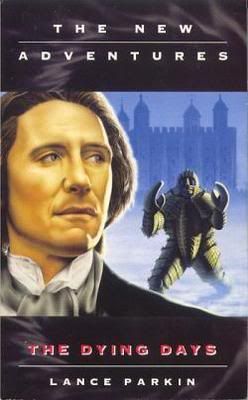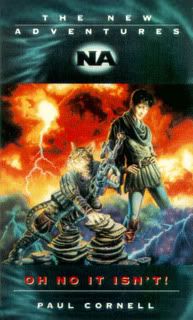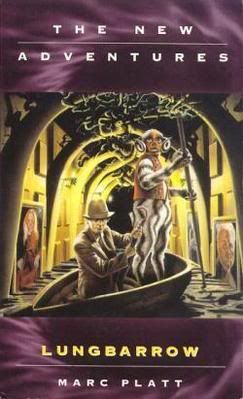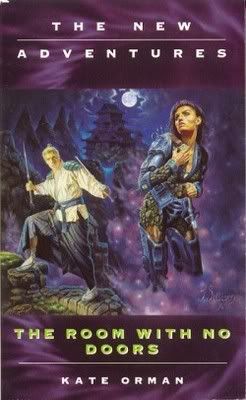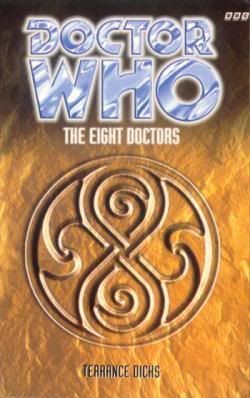
The Eight Doctors by Terrance Dicks
In Brief: Suffering from amnesia, The Doctor must (all together now) FIND HIS OTHER SELVES!!!
Here we go, into the great unknown. Having originally departed the world of Doctor Who fiction with the wrap-up of The New Adventures I'm approaching each of these BBC Books "Eight Doctor Adventures" with little to no preconceptions. Well except for (based on memories of reviews/newsgroup comments from the late 1990s):
1. New companion Sam Jones is apparently the most irritating character ever introduced to the series and I will soon pray for her horrible death.
2. There are a couple of Dalek stories coming up early in the run. This is notable since Virgin never obtained the rights to use the Daleks directly in their books. Also the books in question are apparently awful (will confirm later...).
3. The Eight Doctors is the worst book written by anyone. Ever.
And that's it. I know very little about the 70-something books that were published in the series between 1997 and 2005. At the time I'd decided to stick to the Benny books, and when they ended I didn't want to start this series part-way through. Then in 1999 with Big Finish releasing their audio adventures there was a way to get a Doctor Who fix that felt much more authentic than these books, especially once they got Paul McGann to record some “real” Eighth Doctor stories.
Overall the feeling I've always had towards the BBC Books series is that they're alright but somewhat a pale imitation of the New Adventures, perhaps more consistent but less imaginative. However this is purely based on my reading the online opinion of various hardcore "Doctor Who Fans", and if there's anything I've learned in life it's to try to ignore the online opinion of hardcore "Doctor Who Fans" as much as possible.
As that road leads only to the Absorbaloff
But now I'm taking the plunge into BBC Books’ output, and with The Eight Doctors it really *is* starting at the deep end. The reason being that this book is possibly the biggest misstep in the entire almost 50-year history of Doctor Who. I can imagine that intentions were good; the editors would get a known name from the show to write the introductory story. It would bring things "back to basics" after the view held (by some) that the New Adventures had gotten somehow away from what Doctor Who should be RAWR! The problem with this mind-set though in that the only thing that Doctor Who ever *should be*is giving the audience something new.
The Dying Days gave us a new way to tell an old story, the very 1970s-style alien-invasion transposed into the present day (of 1997). The Eight Doctors is Terrance Dicks telling a (sort of) new story in a very old way. Having been script editor on the show proper from 1969 to 1974 I suspect that Dicks sees himself as being the "Elder Statesman" of Doctor Who, showing the “youngins” how IT SHOULD BE DONE DAMNIT! Unfortunately he tries this feat by bringing Doctor Who creatively kicking and screaming back to 1972. Rather than brushing aside the perceived clutter this is Terrance Dicks waving his fist in the air and screaming "You Damn Kids get OFF MY LAWN!" to anyone who'd altered the series in the slightest since he'd been in charge.
The result is close to what a Doctor Who story would be like if recounted by Grandpa Simpson, meandering and pointless (or should that be wheezing and groaning?). Having lost his memory due to a leftover trap of The Master's following events of the TV-movie, The Doctor must find each of his previous incarnations in order to remember his life. First though he briefly arrives in the present day and meets vegan-gymnastics student Sam(antha) Jones, who is running from some drug-dealers. I suspect a lot of the book's bad reputation comes from these early chapters, which are horribly written. I'd be critical if these passages were part of some amateur fan-fiction let alone a man who by this point had been professionally an author for close to 40 years.
However, once The Doctor leaves Sam to her fate (however not permanently) the book does improve, albeit relatively. In order we have the Eighth Doctor meeting versions one through seven during or just after various televised stories. I found each of these sections less about visiting the history of Doctor Who as much as being a chance for Terrance Dicks to offer his commentary on everything from 1963 to 1989.
Doctor 1: As the first Doctor contemplats stabbing a caveman to death during "An Unearthly Child" the Eight appears to tell him to be nice. This is Dicks saying that the Hartnell Doctor isn't quite what he wants the character to be, but will be with a few tweaks.
Doctor 2: Amidst "The War Games" the Doctors briefly meet as the Eighth gives the Second some tips for his upcoming trial. This is Dicks not having much to say about the Troughton era since as he was involved in it the show must have been perfect.
Doctor 3: Just after "The Sea Devils" as The Master escapes and finds his Tardis where he left it (so we also get a revisit to the scene of "The Daemons"). Jon Pertwee is obviously where Dicks has his notion of the Doctor stuck, the man of action who is "never cowardly". Although to the rest of us he comes across like a bit of an arrogant and condescending arse.
Doctor 4: The Fourth Doctor and Romana have some increased difficulty with vampires just after "State of Decay". Dicks likes Tom Baker, but as he was in his earlier seasons, back when he was still writing for the show.
Doctor 5: (Good Grief) The Fifth Doctor, Tegan and Turlough once again visit the Eye of Orion after "The Five Doctors". Encouters with the Raston Warrior Robot, Sontarans and Drashigs ensue. The Davison Doctor is bland and far too nice says Dicks, although he is appropriate in filling this section with nonsensical returns from old monsters.
Doctor 6: Set during "The Trial of a Time Lord" as the Eighth and a temporally-displaced version of the Sixth attempt to explain the complexities of that story. This part ends with Dicks stating that the entire trial actually never happened through use of a time-loop. If it were up to him this Doctor would never have happened as Colin Baker was a fat buffoon.
Doctor 7: Following "Survival" as the Master prepares for the TV-movie (death-worms are involved) and the Seventh Doctor mopes around solo on Metebelis 3. The McCoy Doctor is just so not fun says Terrance. Who wants a Doctor who thinks ahead?
Then at the end The Doctor whips back to allow Sam Jones to join him in his travels for no apparently good reason (and her first scene in the Tardis is just strange). Mixed among these assorted set-pieces are scenes as Timelord President Flavia (don't ask) follows The Doctor's progress as various factions on Gallifrey try to kill him. Or something.
So yes, in this instance Internet fandom is right and The Eight Doctors is awful, although in a somewhat interesting way. I didn't hate it the same way as I have some other "New" adventures and after the terrible opening section I sort of got with the flow of what Terrance Dicks was doing. It’s the same as how occasionally a slightly senile grand-parent can spin a mildly interesting tale. This is a grumpy old man complaining that everybody who followed him has done it wrong without wanting to admit that he’s actually just old-fashioned. This book is the perfect case for why Doctor Who needs to constantly have new and fresh talent involved in its construction.
